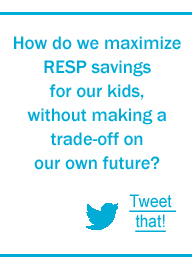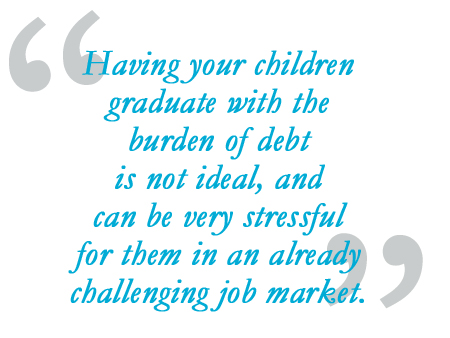By Karin Mizgala, Co-Founder and CEO Money Coaches Canada

From the moment our children are born we want the best for their future. Success is never guaranteed, but we hope to be able to offer them opportunities. And what better opportunity is there than education? It seems like a straight forward assumption that we would contribute to a Registered Education Savings Plan (RESP) on their behalf.
But what about our own future? What about contributing to a Registered Retirement Savings Plan (RRSP)? Canadians are living longer, and the cost of living is on the rise. If we don’t have a solid retirement plan, are we at risk of living in our well-educated child’s basement? OK, that may be a tongue-in-cheek option, but the question of where to place our investment dollars is valid. What’s a parent to do?
With RRSP season is full swing, now is the perfect time to weigh your options and make the right decision between RRSP and RESP. This year, the deadline is March 1 for RRSP contributions – you have until then to add funds into your RRSP and claim that contribution when you file your 2018 income tax return later this year.
The Fundamentals: What You Need to Know
RRSPs – Make an RRSP contribution and you get money back from the government in the form of a tax deduction. Depending on your tax bracket, a $1,000 contribution to your RRSP can reduce your tax bill by $400. You are taxed on the money when you withdraw it, but since most people have a lower tax bracket at retirement this is an excellent additional benefit.
RESPs – Open one and you’ll be eligible for the Canada Education Savings Grant (CESG) that will match at least 20% of your RESP contributions (up to $500) on an annual basis to a maximum lifetime grant of $7,200 per child (extra grants are available depending on your income). So, put in $500 the first year and the Government of Canada will give you another $100 in grant money to put towards your child’s education.
So let’s compare future scenarios: the time has come for your child to attend higher education and there isn’t enough money, versus you reaching retirement age without adequate funds. First, we’ll look at some reasons that it may be best to focus on our retirement needs and then we’ll look at some of the benefits for an RESP focus.
The Case for the RRSP
We need to be able take care of all our needs at retirement. Without a solid foundation of savings and investments, we risk having our standard of living decline. Canadians are living longer than ever, and outliving our money is the greatest risk of not having a solid retirement plan.
 We may not be able to actually retire. Without adequate savings and without wanting to increase our debt in our senior years, we may find ourselves needing to work to supplement our financial needs. But is that what we want for ourselves? Some people do, but many others have plans to pursue hobbies and travel, or spend time with their grandchildren. But even those willing to work may find that ill health, their own or their spouse’s, make this an impossible option. Our children on the other hand, have stamina and youth on their side if they need to work while going to school.
We may not be able to actually retire. Without adequate savings and without wanting to increase our debt in our senior years, we may find ourselves needing to work to supplement our financial needs. But is that what we want for ourselves? Some people do, but many others have plans to pursue hobbies and travel, or spend time with their grandchildren. But even those willing to work may find that ill health, their own or their spouse’s, make this an impossible option. Our children on the other hand, have stamina and youth on their side if they need to work while going to school.
We may not qualify for loans. If we don’t have enough money, we may be forced to remortgage our homes or take loans. But depending on our situation, will we even qualify? If our children are short of money for their education they can also seek financing. Our children, with precise needs for a short period of time, and years of earning potential ahead of them may have a better chance of securing the loans they need.
An RRSP may have a better return on investment than an RESP. Another reason to choose an RRSP over an RESP is that higher income earners could receive up to 50% of the amount they contribute back as a tax refund (depending on their province and tax bracket), while the maximum RESP grant available is 20% of the amount you contribute, in most cases.
The Case for the RESP
So what about our children? What are the risks to their financial future without the benefits of RESP savings?
Debt can make establishing a career harder. Having your children graduate with the burden of debt is not ideal, and can be very stressful for them in an already challenging job market. It may lead to jumping at the first opportunity for a paycheque instead of weighing options, and choosing a position that may mean less pay now but bigger professional opportunities down the road.
 Are summer employment and part time jobs even enough? Many students do not have the option of living at home while studying, and the cost of room and board sends the price of education well over $20,000 a year. That’s a steep bill on minimum wage. A large contribution from an RESP could easily become the difference between your child attending the school of their choice instead of settling for an academic institution closer to home.
Are summer employment and part time jobs even enough? Many students do not have the option of living at home while studying, and the cost of room and board sends the price of education well over $20,000 a year. That’s a steep bill on minimum wage. A large contribution from an RESP could easily become the difference between your child attending the school of their choice instead of settling for an academic institution closer to home.
A Few Questions to Ask Yourself
So how do you weigh your situation? The most important thing is clarity. If you value education you may want to maximize RESP savings for your children, but you have to be certain you aren’t making a risky trade-off on your own future.
Depending on how old you are when your children are born, you may be able to take advantage of that “free” money (Canada Education Savings Grant) and still have many years to focus on your retirement savings.
In order to help you make the right decision based upon your unique circumstances, ask yourself the following questions:
- How much do you have available for savings? If you don’t know, download our Spending and Savings plan or call a Money Coach.
- Are you on track for your own retirement? It’s important to help the kids but make sure you’re taking care of yourself! Be sure you know your retirement numbers. Use our Financial Freedom calculator or call a Money Coach.
- Your personal philosophy. How important is it to you to fund your kids’ education? For some, their desire to contribute to their kids’ schooling trumps everything else.
- What’s your tax bracket? The higher your tax bracket, the larger the benefit from investing in an RRSP. If your taxable income is over $145K your RRSP contribution would provide a tax refund in the 45% range (depending on your province). A $10K contribution would generate a refund of $4.5K.
With a clear look at your current finances and a plan that considers the big picture, there is probably a nice compromise that can support your retirement needs and your hopes for your children’s future.



The paragraph on “An RRSP has a better return …” does not provide a proper comparison. Both RESP and RRSP have benefits and disadvantages – one of RESP’s is that it can also compound tax-free similarly to an RRSP. As you noted, an RRSP can compound greatly over 17 years but in your calculation for RESP’s you only included the 20% government matching contribution plus the annual capital investment, no growth potential ($2,500 plus 20% gov’t match = $3,000 x 17 years = $51,000).
The rate of return on the selected investment would determine the Future Value of the investment and many RESP investments can provide similar rates of return to RRSP. A quick analysis of the $280K claim shows $2,500 RRSP compounding around 15.5% annually for 17 years with full refund reinvested, a somewhat unrealistic expectation. Regardless, if you can get 15.5% on RRSP, you can expect the same from a RESP with similar risk profile.
While I concur with the other points, compare apples-to-apples on the rate of growth between the two and you’ll find very little differentiation.
Hello James,
Thank you very much for bringing this error to our attention. We have corrected this section of our article.
Tempted to invest heavily in RRSPs.. ( i have to room) and use the income tax returns difference to invest in RESP’s… not sure if it beneficial to do this or not…
Hello Dave,
Depending on your particular situation, contributing to your RSP and then using the resulting tax refund to contribute to your RESP might be an excellent idea. This strategy will help you work towards both goals of saving for your children’s education and your own retirement.